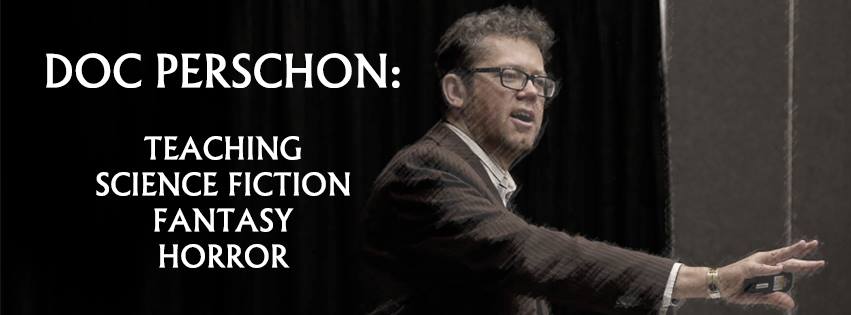I teach a book in my introductory composition class called They Say, I Say, which states that we do not write from a vacuum. We need ideas to respond to before we can write. And we should know the conversation we are entering into as well. I'm still in the process of getting into the conversation, having only read primary works in 2014. I found little time or compulsion to read secondary literature. I think that will change now that I have read some of those writers and works I'd only ever had second-hand contact with.
For any who are interested, here is the list of speculative novels and short fiction I read in 2014, in no particular order.
Fantasy:
- Throne of the Crescent Moon by Saladin Ahmed
- The Colour of Magic by Terry Pratchett
- The Hogfather by Terry Pratchett
- The Hundred Thousand Kingdoms by N.K. Jemisen
- Galilee by Clive Barker (Re-read)
- A Wizard of Earthsea by Ursula K. LeGuin
- The Riddle-Master of Hed by Patricia A. McKillip
- All the Bells on Earth by James Blaylock
- Krampus by Brom
- A Christmas Carol by Charles Dickens
- The Iron Dragon's Daughter by Michael Swanwick
- Night's Engines by Trent Jamieson
- Seventh Son by Orson Scott Card
Science Fiction
- Leviathan Wakes by James S.A. Corey
- Caliban's War by James S.A. Corey
- Earth Abides by George R. Stewart
- Hyperion by Dan Simmons
- Pavane by Keith Roberts
- A Canticle for Leibowitz by Walter M. Miller Jr.
- "Flowers for Algernon" by Daniel Keys
- "A Martian Odyssey" by Stanley G. Weinbaum
- Brown Girl in the Ring by Nalo Hopkinson
- Rendezvous With Rama by Arthur C. Clarke
- War of the Worlds by H.G. Wells
- The Postman by David Brin
- Edge of Tomorrow by Hiroshi Sakurazaka
Horror
- Frankenstein by Mary Shelley
- The Haunting of Hill House by Shirley Jackson
- I Am Legend by Richard Matheson
- Something Wicked This Way Comes by Ray Bradbury
- The Broken Hours by Jacqueline Baker
- Feed by Mira Grant
- 14 by Peter Clines
And I read Kaiju Rising: Age of Monsters, which was an anthology of giant monster fiction, ranging through all three speculative genres. Contrary to what you might thing about giant monsters in prose, it was a really great anthology - I only skipped a handful of stories.
Out of the 33 novels and short stories listed here, 25 were from my 200 Year Spec Lit project. Four were from my Speculative Lit Advent, when I read speculative literature related to the Christmas/Solstice/Yule traditions. The rest were just "whatever the hell I want to read."
My second year in this project is moving along well, and, despite regular additions to the stack (which I'm replenishing solely through used bookstores, thrift shops, and local bookstores - I vowed to keep Amazon out of the loop this time), I'm confident this is still achievable in a decade.
Best books I read in each category of speculative fiction in 2014: For fantasy, it has to be The Iron Dragon's Daughter by Michael Swanwick, which is one of the most original approaches to both epic and urban fantasy I've ever read. Elves doing cocaine? The mall being a Rip-Van-Winkle time sink? Dragons as sentient stealth bomber? So inventive. I think it's tied with Saladin Ahmed's Throne of the Crescent Moon, because I've been waiting for a cleric/paladin story for a long time, and Ahmed handles his fantasy religious elements with both verisimilitude and respect. For science fiction, it's Dan Simmon's Hyperion, which nearly became the only novel I'd use in teaching speculative literature at MacEwan next year. It's like one of those beer or wine samplers: there's military SF, aliens, artificial intelligence, post-apocalypticism, space opera, and a dizzying number of great English Lit intertextuality. For Horror, my favourite read was Jacqueline Baker's The Broken Hours, for its strong narrative voice and subtle creepiness.

